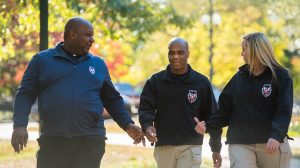
The University of Mississippi Police Department has several programs in place that have helped the university become one of the nation’s safest campuses, according to the National Council for Home Safety and Security. Photo by Kevin Bain/Ole Miss Communications
OXFORD, Miss. – The University of Mississippi, which has a mobile app, training and other programs aimed at preventing crime, has been named one of the nation’s safest college campuses.
The National Council for Home Safety and Security ranked Ole Miss, which has an enrollment of more than 23,000, No. 64 nationally among public universities. UM placed second on the list among Southeastern Conference schools, trailing only Texas A&M University.
The safest campus on the list is Brigham Young University-Idaho in Rexburg, Idaho. The only other Magnolia State campus on the list is Mississippi State University, which comes in at No. 121 among public universities.
UM ranks among the top 28 percent of college campuses on the list of 243 public and private higher education institutions with enrollments of more than 10,000.
“The men and women of the University Police Department are committed to providing the best safety services possible,” said Ray Hawkins, assistant university police chief. “We have a group of creative, proactive problem-solvers who take pride in serving this campus community.
“They are a well-rounded group who are committed to patrolling the campus, conducting crime prevention programs and thoroughly investigating crimes when they occur.”
Hawkins said personal safety resources such as the LiveSafe app, a mobile safety communications platform for students, faculty and staff; the “Deny, Apply, Amplify” or “DA2” personal safety program; as well Rebel Patrol safe walk program and training to prepare for an active shooter incident for all incoming freshmen, have helped. He also notes that UPD undertakes customized security assessments ahead of most campus events and the university has installed security cameras throughout campus.
The National Council for Home Safety and Security used the most recent data from the Federal Bureau of Investigation’s Uniform Crime Reporting and the U.S. Department of Education’s Campus Safety Security Survey to determine where schools ranked.
The highest-ranked campuses boast low total campus and local area crime. University campuses with a significant lack of reported data were excluded, as well as all nonaccredited universities offering four-year degrees.
The NCHSS is a trade association made up of home security professionals across the United States. It advocates for safe communities and home safety with a strong focus on community involvement.
Jeff Kellum, UPD’s crime prevention coordinator, said rankings are a good place to start when evaluating a campus’ security. He also advises seeking out answers from the institutions about how the campus cultivates a culture of safety, how it communicates with students during an emergency, whether police are stationed on campus and who investigates allegations of sexual assault and harassment.
He also suggests asking about prevention programs in place to educate students.
The UPD program with the most participation is the active shooter response training, but UPD’s personal safety classes have seen the largest growth, Kellum said. Several semesters ago, he began working with student leaders to develop classes that address the specific needs of the campus community.
The end product is the DA2 class, a personal safety program that promotes campus risk-reduction strategies while building recognition and response skills through weekly classes. UPD officers and student instructors give training on developing justified responses to multiple threat levels.
UPD has students who serve as lead instructors for its weekly classes, and more are training to become assistant instructors.
“We developed an instructor manual so we can continue to train student instructors for the future,” Kellum said. “Student leaders have made a huge impact on participation. In the past, we would average 24-30 participants annually. We now train 40-45 weekly.”
Brandi Hephner LaBanc, UM vice chancellor for student affairs, said she’s pleased that UPD officers and the campus community are receiving recognition for efforts to keep students safe.
“I am extremely proud of the service and 24/7 commitment provided by the men and women of UPD to keeping faculty, staff and students safe,” Hephner LaBanc said. “I am most impressed with their responsiveness and level of care for every person they serve.
“I am proud to work with UPD and will continue to advocate for ways to keep our campus safe.”